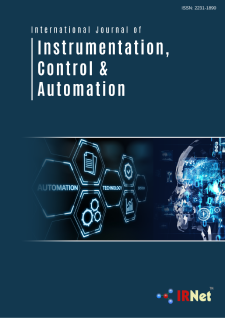International Journal of Instrumentation Control and Automation IJICA
ISSN: 2231-1890

Abstracting and Indexing


IJICA
A Novel Approach for Transmission Line Protection Using Wavelet Transform and Neural Network
Mrunalini M. Rao
1Dept. of Electrical Engineering, SVSSCER Nagpur, RTM Nagpur University, India,
P.M. Deoghare
Dept. of Electrical Engineering, YCCE, Nagpur, India
Abstract
The two most important expected objectives of the transmission line protection are – 1) Differentiating the internal faults from external faults and 2) identifying exactly the fault type using one end data only. In conventional distance protection scheme only 80 percent of line length gets primary protection while for remaining 20 percent of line length a time delay is provided to avoid maloperation due to overreach in case of D.C. offset. In this new scheme a fault generated transients based protection method is introduced by which the whole line length gets primary protection by using the concept of bus capacitance. This scheme implements improved solution based on wavelet transform and self-organized neural network. The measured current and voltage signals are preprocessed first and then decomposed using wavelet multiresolution analysis to obtain the high frequency and low frequency information. The training patterns are formed based on high frequency signal components and the low frequency components of all three phase voltages and current. Zero sequence voltage and current are also used to identify faults involving grounds. The input sets formed based on the high frequency components are arranged as inputs of neural network-1, whose task is to indicate whether the fault is internal or external. The input sets formed based on the low frequency components are arranged as inputs of neural network- 2, whose task is indicate the type of fault. The new method uses both low and high frequency information of the fault signal to achieve an advanced transmission line protection scheme.
Recommended Citation
[1] G. Phadke and J. S. Thorp, ‘Computer Relaying
for Power Systems’, Taunton, U.K.: Wiley, 1988.
[2] S.N.Sivanandam, S.Sumati and S.N.Deepa,
‘Introduction to Neural networks using
MATLAB 6.0’, Tata McGraw Hill Publishing
Company Limited’, New Delhi, 2008.
[3] Nan Zhang and Mladen Kezunovic, Transmission
Line Boundary Protection Using Wavelet
Transform and Neural Network’, in IEEE
Transactions On Power Delivery, Vol. 22, No. 2,
April 2007,pp. 859-869
[4] Z. Q. Bo, F. Jiang, Z. Chen, X. Dong, G. Weller,
and M. A. Redfern, ‘Transient based protection
for power transmission systems’, in Proc. IEEE
Power Eng. Soc. Winter Meeting, Singapore, Jan.
2000, vol. 3, pp. 1832–1837.
[5] Z. Q. Bo, “A new non-communication protection
technique for transmission lines,” IEEE Trans.
Power Del., Oct. 1998,vol. 13, no. 3, pp. 1073–
1078.
[6] A. T. Johns and P. Agrawal, “New approach to
power line protection based upon the detection of
fault induced high frequency signals,” Proc. Inst.
Elect. Eng., Gen., Transm. Distrib., vol. 137, no.
4, pp. 307–313, Jul. 1990.
[7] Z Q Bo, B H Zhang, J H He, X Z Dong, B R J
Caunce, A Klimek, ‘An Integrated Boundary
Protection Scheme for Power Transmission Line
Systems’, The 8th International Power
Engineering Conference (IPEC 2007).
[8] A. G. Phadke and S. H. Horowitz, “Adaptive
relaying,” IEEE Computer Applications in
Power, vol. 3, no. 3, pp. 47–51, July 1990.
[9] T. Kakagi, J. Bab, K. Uemura, and T. Sakaguchi,
“Fault protection based on traveling wave theory
– Part 1: Theory,” in Proc. IEEE PES Summer
Meeting, Mexico City, Mexico, July 1977, vol. 3,
pp. 750–753.
[10] H. W. Dommel and J. M. Michels, “High speed
relaying using traveling wave transient analysis,”
in Proc. IEEE PES Winter Meeting, New York,
Jan./Feb 1978, vol. 3, pp. 214–219.
[11] P. A. Crossely and P. G. McLaren, “Distance
protection based on traveling waves,” IEEE
Trans. Power Apparatus and Systems, vol. 102,
pp. 2971–2983, 1983.
[12] A. H. Osman and O. P. Malik, “Transmission line
distance protection based on wavelet transform,”
IEEE Trans. Power Del., vol. 19, no. 2, pp. 515–
523, Apr. 2004
[13] T. S. Sidhu, H. Singh, and M. S. Sachdev,
“Design, implementation and testing of an
artificial neural network based fault direction
discriminator for protecting transmission lines,”
IEEE Trans. Power Delivery, vol. 10, no. 2, pp.
697–706, Apr. 1995.
[14] M. Kezunovic and I. Rikalo, “Detect and classify
faults using neural nets,” IEEE Computer
Applications in Power, vol. 9, no. 4, pp. 42–47,
Oct. 1996.
[15] Wavelet Toolbox User’s Guide The MathWorks
Inc.,Natick, MA, 2005 [Online]. Available:
http://www.mathworks.com